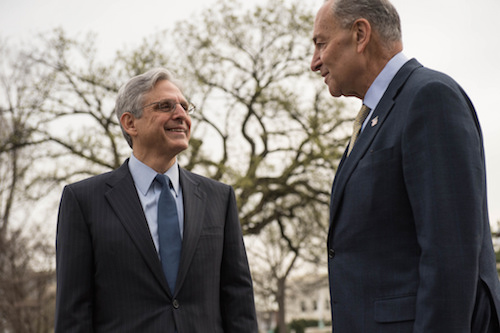As expected, the Supreme Court on March 29 announced it was unable to render an opinion in the controversial anti-union case Friedrichs v. California Teachers Association, a result that will draw sighs of relief from unions with public sector members across the United States.
The 4-4 tie came as a result of the death in February of Associate Justice Antonin Scalia, who had been widely expected to join the court’s conservative majority to rule against labor’s ability to collect fair share fees from non-members. A decision in favor of Rebecca Friedrichs and her co-plaintiffs would have effectively made every public sector workplace in America right-to-work.

|
|
New York Senator Chuck Schumer meets with Supreme Court
nominee Judge Merrick Garland outside the U.S. Capitol in March. Photo courtesy
Senate
Democrats
.
|
Now, the decision of the lower 9th Circuit Court of Appeals stands, and the anti-union lawyers shoulder much of the blame. In attempting to speed their case directly to the highest court, the Friedrichs attorneys actually asked lower courts to rule against them without serious argument so their appeals would move more quickly up the legal ladder.
With the Supreme Court’s deadlock official, legal experts say this is the end of the road for Friedrichs, but it won’t be the last case of its kind to work its way through the courts. A challenge to fair share fees in Illinois had been put on hold pending the Supreme Court’s decision, so that case could be revived at any time.
That challenge and the many more likely to follow, however, highlight the critical importance of the current battle over President Barack Obama’s Supreme Court nominee, Merrick Garland, who Republican senators are refusing to consider to replace Scalia until after the November election.
Majority Leader Mitch McConnell and Judiciary Committee Chairman Chuck Grassley argue that an outgoing president should not be able to perform his constitutional duty to nominate a new justice and that the privilege should instead be held over for the new commander-in-chief, who will take office in January 2017.
The backlash from the White House, Democrats in the Senate and presidential contenders Bernie Sanders and Hillary Clinton has been strong, with the rallying cry, “Do your job,” being directed at the intransigent GOP senators as many of them campaign for reelection in November. Polls show nearly two-thirds of Americans, including 55 percent of Republicans, believe Garland deserves fair hearings in the Senate. More than half believe he should be confirmed.
With the Court divided 4-4 on many of the most important cases, it could be hamstrung for the better part of two full terms before it again seats a full roster of justices.
In announcing Garland’s nomination Mar. 16, Obama praised the longtime judge’s credentials.
“I’ve selected a nominee who is widely recognized not only as one of America’s sharpest legal minds,” he said, “but someone who brings to his work a spirit of decency, modesty, integrity, even-handedness, and excellence.”
“Presidents do not stop working in the final year of their term; neither should a senator,” Obama added.
Cover Photo used under
a Creative Commons license from Flickr user
David Staedtler.